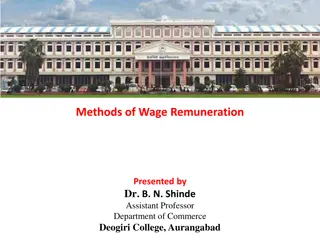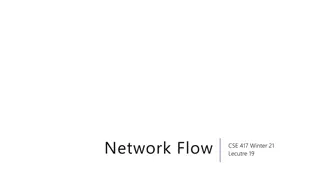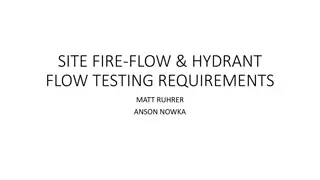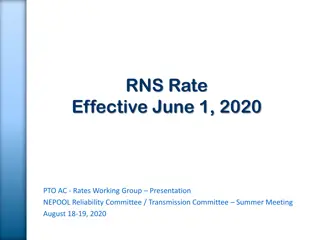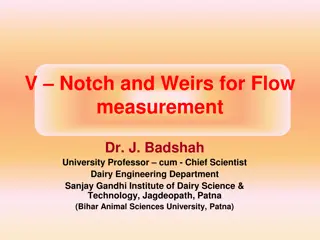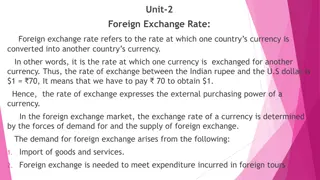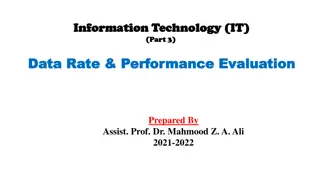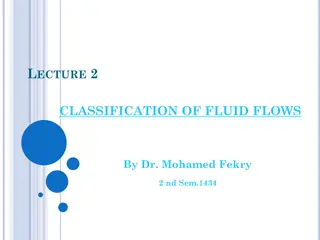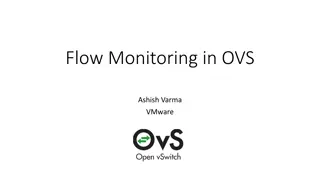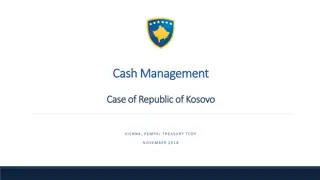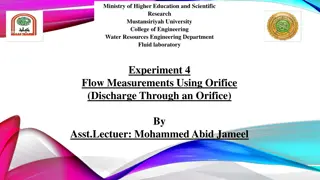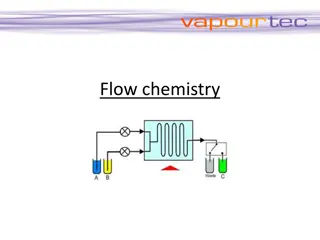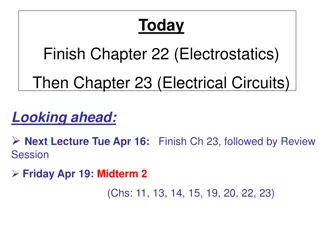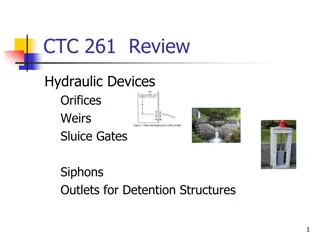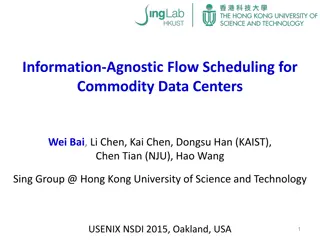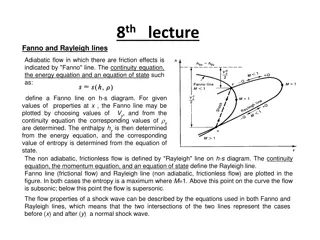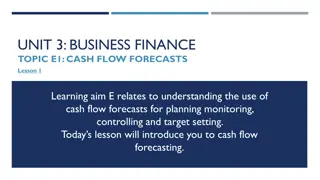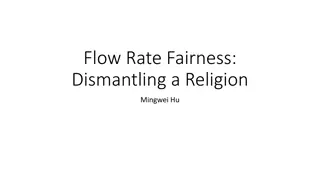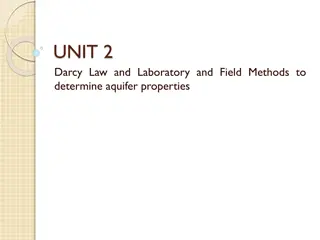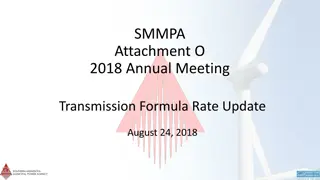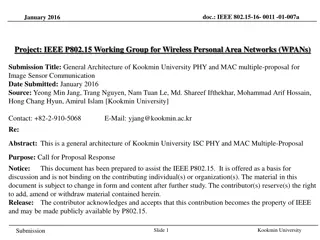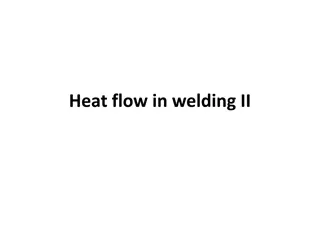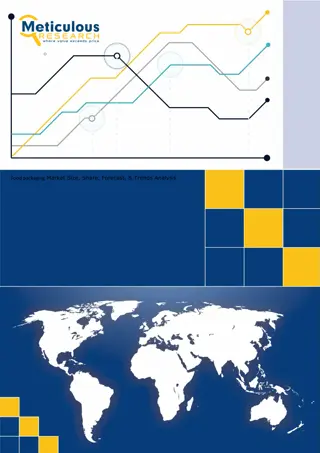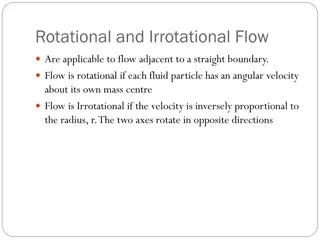Managing Interest Rate and Currency Risks: Strategies and Considerations
Interest rate and currency swaps are powerful tools for managing interest rate and foreign exchange risks. Firms face interest rate risk due to debt service obligations and holding interest-sensitive securities. Treasury management is key in balancing risk and return, with strategies based on expect
4 views • 21 slides
Improving Heat Rate Efficiency at Illinois Coal-Fired Power Plants
Heat rate improvements at coal-fired power plants in Illinois are crucial for enhancing energy conversion efficiency, reducing carbon intensity, and minimizing pollution. By increasing the heat rate/efficiency by 6%, these plants can generate more electricity while burning the same amount of coal. T
2 views • 11 slides
Wage Remuneration Methods Overview
Dr. B. N. Shinde, Assistant Professor at Deogiri College, Aurangabad, presents an insightful overview of methods of wage remuneration including Time Rate System, Piece Rate System, and Combination of Time and Piece Rate System. Time Rate System is the oldest method where workers are paid based on ti
0 views • 16 slides
The Psychology of Flow: Achieving Total Focus and Optimal Performance
Engage in activities for their intrinsic value, where the ego diminishes, and time seems to vanish - that's when flow occurs. This optimal psychological state involves deep concentration, clear goals, and a sense of control. By embracing challenges and staying in the present moment, one can cultivat
0 views • 13 slides
Understanding Runoff in Hydrology
Runoff in hydrology refers to surface water flow from precipitation and other sources in drainage basins. It plays a crucial role in stream flow and peak flood formation, influenced by factors like overland flow, interflow, and groundwater flow. This article explores the sources of runoff, including
3 views • 27 slides
Understanding Max Flow in Network Theory
In network theory, understanding the concept of maximum flow is crucial. From finding paths to pushing flow along edges, every step contributes to maximizing the flow from a source to a target in the graph. The process involves determining capacities, creating flows, and calculating the net flow ent
2 views • 41 slides
Fire Flow Requirements and Calculation Methods
Detailed information on site fire flow and hydrant flow testing requirements, how to calculate required fire flow, applicable codes and standards including NFPA and IBC, duration of fire flow, methodologies for fire flow calculation, and ISO methods and formulas.
4 views • 30 slides
Transmission Rate Change Overview for June 1, 2020
Presentation on the Rate Change effective June 1, 2020, detailing RNS Rate adjustments, Annual Transmission Revenue Requirements, and Regional Forecasts. The RNS Rate increased to $129.26/kW-year reflecting transmission project impacts, while ATRR analysis showed changes in revenue requirements for
0 views • 25 slides
Flow Measurement Using V-Notch and Weirs in Engineering
Flow measurement in engineering involves the use of V-notch and weirs, such as rectangular weirs and triangular weirs, to calculate discharge rates and velocity of liquids. A V-notch is a triangular obstruction used for flow measurement, while weirs are larger scale structures for measuring river or
1 views • 7 slides
Understanding Foreign Exchange Rates and Market Forces
Foreign exchange rate is the rate at which one country's currency is converted into another's, reflecting purchasing power. The rate is determined by demand and supply in the foreign exchange market, influenced by factors like imports, exports, investments, and speculation. Equilibrium rate is reach
0 views • 42 slides
Understanding Data Rate Limits in Data Communications
Data rate limits in data communications are crucial for determining how fast data can be transmitted over a channel. Factors such as available bandwidth, signal levels, and channel quality influence data rate. Nyquist and Shannon's theoretical formulas help calculate data rate for noiseless and nois
0 views • 4 slides
Understanding Heart Rate Variations During Rest and Exercise
This experiment focuses on measuring heart rate at rest and after physical exercise, exploring the factors that influence heart rate changes. Through hands-on activities and theoretical lessons, students learn about the cardiac cycle, the circulatory system, and the impact of physical exertion on he
1 views • 22 slides
Importance of Cash Flow Analysis in Financial Management
Cash flow analysis is a crucial financial tool for effective cash management, aiding in evaluating financial policies and positions. It helps in planning, coordinating financial operations, assessing cash needs, and meeting obligations. However, it has limitations as it does not substitute the incom
1 views • 7 slides
Estimation of Drying Time in Spray Drying Process: Diffusion and Falling Rate Periods
The estimation of drying time in a spray drying process involves understanding diffusion-controlled falling rate periods, constant rate periods, and the mechanisms by which moisture moves within the solid. The drying rate curves depend on factors like momentum, heat and mass transfer, physical prope
0 views • 8 slides
Understanding Fluid Flows in Fluid Mechanics
Fluid Mechanics is the study of fluids in motion or at rest, and their interactions with solids or other fluids. Fluid flows are classified based on various characteristics such as viscous versus inviscid regions, internal versus external flow, compressible versus incompressible flow, laminar versus
1 views • 16 slides
Understanding Flow Monitoring in OVS for Efficient Network Management
Learn how Flow Monitoring in Open vSwitch (OVS) allows controllers to track and manage changes to flow tables, enabling efficient network management. Explore topics such as Flow Mod programming, Flow Monitor messages, OVS support, monitoring vs. snoop, and practical examples of flow monitoring in ac
0 views • 9 slides
Cash Management Case Study: Republic of Kosovo's Treasury Operations
Explore the cash management practices and treasury operations of Kosovo's State Treasury, highlighting its responsibilities, organizational structure, revenue, expenditures, primary balance, and cash flow forecasting methods. Learn about the budget organization's cash flow preparation process, fund
0 views • 14 slides
Flow Measurements Using Orifice: Experiment in Fluid Laboratory
Understanding the principles of flow measurement through an orifice meter is essential in engineering. This experiment aims to determine the discharge coefficient of an orifice meter, analyzing the theoretical aspects and addressing sources of error such as mechanical losses and the vena contracta.
3 views • 13 slides
Empirical Analysis of Kuwaiti Dinar Exchange Rate Behavior and Misalignment
This research focuses on studying the behavior of the real equilibrium exchange rate (REER) of Kuwaiti Dinars, estimating the equilibrium exchange rate using the BEER model, and calculating real exchange misalignments (RERM). It delves into the impact of exchange rate fluctuations on macroeconomic v
0 views • 15 slides
Understanding Flow Chemistry for Efficient Chemical Reactions
Flow chemistry, also known as continuous flow or plug flow chemistry, revolutionizes chemical reactions by running them in a continuous flow stream. This dynamic process offers efficient manufacturing of chemical products with precise control over critical parameters like stoichiometry, mixing, temp
2 views • 7 slides
Impact of Dissolved Oxygen and Flow Rate on Watercress Germination and Growth
A study by Claire Cleveland and Dr. Laurie Mauger explores the effects of dissolved oxygen concentration and flow rate on watercress germination and growth. The research includes ecological markers, existing evidence, hypothesis, experimental design, and anecdotal results indicating that watercress
0 views • 15 slides
Understanding Electric Current in Circuits
Electric current is the flow of electric charge between regions of different electric potential. This flow of charged particles, such as electrons, is essential for circuits to function effectively. Voltage sources, such as batteries or generators, maintain a potential difference necessary for susta
0 views • 31 slides
Understanding Open Channel Flow and Mannings Equation
This review covers hydraulic devices such as orifices, weirs, sluice gates, siphons, and outlets for detention structures. It focuses on open channel flow, including uniform flow and varied flow, and explains how to use Mannings equation for calculations related to water depth, flow area, and veloci
1 views • 43 slides
Information-Agnostic Flow Scheduling: Minimizing FCT in Data Centers
This study explores information-agnostic flow scheduling for commodity data centers to minimize flow completion time (FCT) without prior knowledge of flow size. Existing solutions requiring prior flow size information are deemed infeasible for some applications and challenging to deploy in practice.
1 views • 46 slides
Addressing Sewer Rate Changes and Structural Remedies
City's sewer rate changes history and underfunding issues due to lack of cost centering, overburdening the general fund, and inadequate capital project funding. The methodology for rate review highlights the need for reflective rates to cover service costs. The current rate structure shows deficienc
0 views • 19 slides
Understanding E-Rate Program: Education Discounts & Benefits
The E-Rate Program, also known as Education Rate, offers discounts to schools and libraries for affordable telecommunications and Internet access. Administered by USAC, this program aims to provide crucial funding and support to educational institutions. With an annual budget of $3.9 billion and dis
0 views • 35 slides
Understanding Max-Flow and Min-Cut Problems in Graph Theory
This collection covers the concepts of max-flow and min-cut in directed graphs, focusing on moving water or data packets from a source to a target vertex within given capacities. It explains flow values, finding optimal solutions, and strategies for maximizing flow networks. The visuals aid in grasp
0 views • 58 slides
Understanding Fanno and Rayleigh Lines in Adiabatic Flow
Fanno and Rayleigh lines on the h-s diagram help in analyzing adiabatic flow with friction effects. The Fanno line represents frictional flow, while the Rayleigh line signifies non-adiabatic, frictionless flow. These lines aid in plotting flow properties and understanding phenomena like shock waves
0 views • 6 slides
Ford-Fulkerson Algorithm for Maximum Flow in Networks
The Ford-Fulkerson algorithm is used to find the maximum flow in a network by iteratively pushing flow along paths and updating residual capacities until no more augmenting paths are found. This algorithm is crucial for solving flow network problems, such as finding min-cuts and max-flow. By modelin
0 views • 26 slides
Understanding Cash Flow Forecasts in Business Finance
This lesson introduces cash flow forecasting in business finance, outlining the importance of predicting, monitoring, controlling, and setting targets for cash flow. It covers key terms, purpose of cash flow forecasting, cash inflows and outflows, and the structure of cash flow forecasts. Students w
0 views • 10 slides
Understanding Rate Expressions in Heterogeneous Systems
In heterogeneous systems, the rate expression involves mass transfer terms alongside chemical kinetics terms due to the presence of multiple phases. Different types of heterogeneous systems have varying mass transfer complexities, making a general rate expression challenging to define. Examples such
0 views • 29 slides
Challenges of Flow Rate Fairness in Network Resource Allocation
Addressing the concept of flow rate fairness in network resource allocation, this content explores its limitations and challenges. Despite being a goal in protocols like TCP, the practicality and enforceability of flow rate fairness are questioned. It highlights the inadequacy of flow rate as a meas
0 views • 15 slides
Understanding Darcy Law and Methods for Aquifer Property Evaluation
Darcy Law, introduced by Henry Darcy, defines the relationship between flow rate, head loss, cross-sectional area, and flow path length in porous media like aquifers. By conducting experiments and measuring hydraulic conductivity, Darcy Law allows estimation of groundwater velocity and flow characte
0 views • 49 slides
SMMPA Annual Meeting Transmission Rate Update 2018
SMMPA, a not-for-profit political subdivision in Minnesota, updated its transmission rate formula in August 2018. The Attachment O timeline outlines crucial dates for stakeholders, including the annual meeting on formula rate updates. SMMPA, as a Transmission Owner in MISO, follows FERC-approved tem
0 views • 8 slides
Understanding Heart Rate and Pulse: Key Differences and Measurement
Heart rate, also known as pulse, is the number of times your heart beats per minute. It varies based on factors like age, fitness level, and emotions. Pulse is a direct measure of heart rate. Learn about the differences between heart rate and blood pressure, how to measure heart rate, and what const
0 views • 8 slides
Basic Hydraulic Flow Control Valves Overview: Types and Functions
Basic Hydraulic Flow Control Valves play a crucial role in regulating fluid flow in hydraulic systems. This comprehensive guide covers various types of flow control valves such as throttle valves dependent on viscosity, meter-in/meter-out/bypass flow control valves, and more. Learn about their funct
0 views • 15 slides
General Architecture of Kookmin University's Image Sensor Communication Proposal
Kookmin University submitted a proposal to the IEEE P802.15 Working Group for Wireless Personal Area Networks, focusing on the PHY and MAC layers for image sensor communication. The document outlines design principles, specifications, frame formats, and considerations for both layers. Definitions re
0 views • 41 slides
Welding Heat Flow and Cooling Rate Calculations
Understanding welding heat flow and cooling rate calculations is essential for determining the critical cooling rate in welding processes. Factors such as plate thickness, number of passes, and relative plate thickness play a crucial role in selecting the appropriate equations for calculating coolin
0 views • 10 slides
mass flow controllers (1)
The global mass flow controllers market is segmented by product type (thermal mass flow controllers, Coriolis mass flow controllers, differential pressure mass flow controllers), flow rate (low (0-50 slpm), medium (0-300 slpm), high (0-1500 slpm)), e
0 views • 5 slides
Understanding Fluid Flow and Measurement Devices
The concept of rotational and irrotational flow adjacent to a straight boundary, along with the dynamics of fluid flows and laws governing fluid flow like the continuity equation and energy equation, are discussed. Insights into devices for flow measurement such as venturimeter, pitot tube, orifices
0 views • 4 slides


